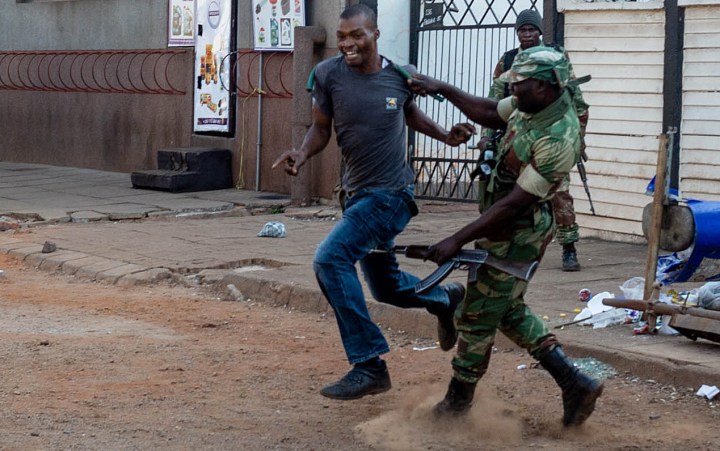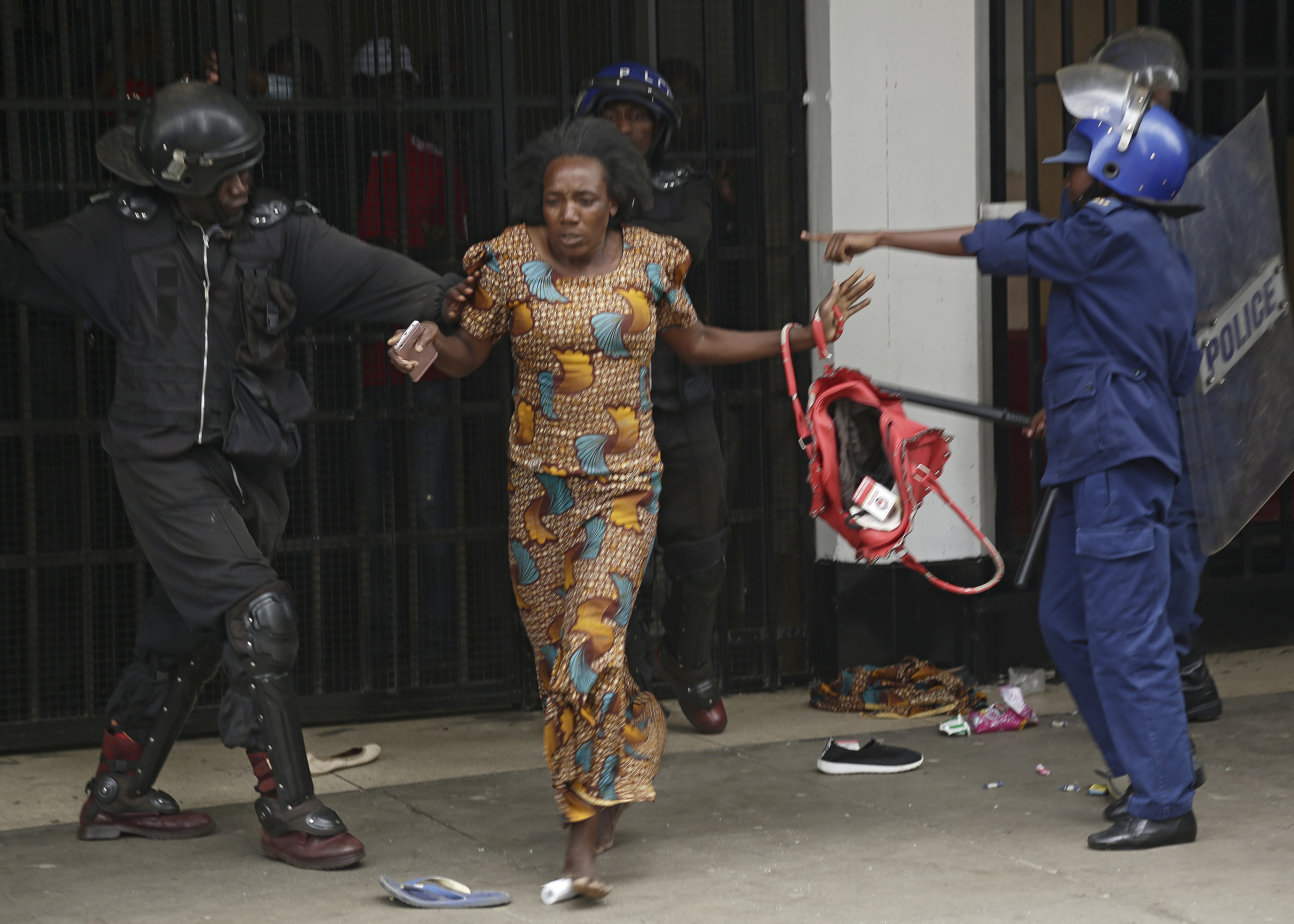VOICES FROM WITHIN OP-ED
Powerful structural violence of the predator state prevents Zimbabweans from living in peace

In Zimbabwe, it is folly to think that we can prevent the violence of the state simply by not participating in demonstrations. The tentacles of the violent state can reach you, even in the comfort of your own home.
For as long as I can remember, Zimbabweans have been described by ourselves and others as a peaceful and peace-loving people. This ‘peaceful nation’ propaganda is also marketed to tourists globally to the point that when we are asked what we like about our country, will tell you “it is beautiful and quiet”.
However, reality betrays us.
From as early as 1980, when Zimbabwe gained independence, there have been reports of electoral violence during every election period. Further, seeing as we experienced genocide in Gukurahundi between 1983 and 1987 — one wonders what exactly the words “peace, peaceful and peace-loving” mean to Zimbabweans.
Read more in Daily Maverick: Remembering Zimbabwe’s forgotten crime scenes
Despite claiming we are a peaceful nation; Zimbabweans will ironically warn each other against triggering the violence of the state. It is common knowledge that the state is violent, and all care must be taken to prevent triggering it and inviting violence on yourself and others.
Each time a crisis occurs in Zimbabwe — such as when Daily Maverick published a detailed report on fuel cartels — two camps emerge. A camp that says the state, through its corruption, is provoking us to protest; and a camp that jumps into panic at the word protest and advises people to be careful not to provoke the state by taking to the streets.
This debate erupted again recently when some were saying we must protest to free MP Job Sikhala and others were saying if we protest, the state will shoot us all.
Read more in Daily Maverick: Free my dad, free Zimbabwe: An appeal from opposition MP Job Sikhala’s son
The message spread by the anti-protests brigade is clear: “the people must behave in order to maintain the peace and prevent the state from unleashing violence.”
Funny, isn’t it, to believe that for peace to prevail, the oppressed must endure oppression in silence. What Zimbabweans are actually saying to each other is that to prevent physical violence in the form of beatings, imprisonment, enforced disappearance, torture and murder, we must suffer in silence.
To Zimbabweans therefore, peace is the absence of violence from the state, physical violence in particular.

Anti riot Zimbabwe Republic Police (ZRP) officers block a road leading to the Democratic Change Alliance headquarters in Harare, Zimbabwe, on 2 August 2018. The Police raid on MDC headquarters followed a violent response by the Zimbabwean army to opposition protests and clashes on 1 August, in which six people were killed, according to reports. (Photo: EPA-EFE/Aaron Ufumeli)
What is violence?
Many schools of thought have accepted the definition that says peace is the absence of violence.
Johan Galtung, a famous peace scholar, says “violence is that which causes the difference between someone’s actual circumstances and their potential circumstances”. That is, the difference between what is and what could/would have been.
For example, if a footballer is shot and has to have his leg amputated, the measure of the violence can be the difference between what they are earning now and their potential earnings had they not been shot. Because he was shot we call what happened to him a violent act. Had he been injured accidentally during a match it would be an accident and not violence.
What determines whether the cause of a person’s suffering is due to violence?
Going by this definition, and looking at Zimbabwe, it is folly to think that we can prevent the violence of the state simply by not participating in demonstrations because the tentacles of the violent state can reach you — even in the comfort of your own home.
For example, Jabu, a young vendor can tell himself that whenever there’s a demonstration in town, to prevent the state from beating him up, or shooting him, he just will not go to work. But what happens if, while he’s at home, he is bitten by a snake? Then he calls an ambulance which takes too long to reach him — because the government has failed to provide public and merit goods.
Eventually, he gets to the hospital, only to find there is no anti-venom, causing him to become paralysed and have to have a leg amputated so that he can no longer work and earn money.
By Galtung’s measure of violence, which looks at what causes the difference between the actual (in this case earnings) and the potential (earnings he would get were he able-bodied) — then Jabu would be a victim of a violent state.
Were it not for corruption and misgovernance, an ambulance would have reached him in time and the hospitals would be stocked with anti-venom. His paralysis and subsequent unemployment would be man-made and thus what happened to him would be deemed violence.

A woman runs away from Zimbabwe Republic Police officers who were beating up protesting Movement For Democratic Change supporters at the party headquarters in Harare, Zimbabwe, 20 November 2019. The supporters were waiting for an address by the party leader Nelson Chamisa before they were attacked by the police. (Photo: EPA-EFE/Aaron Ufumeli)
Many people die in Zimbabwean hospitals from treatable diseases because the government is corrupt and incompetent.
That is violence.
Many children drop out of school because their parents cannot afford to pay school fees due to the government’s failure to deliver on their macroeconomic mandates to provide a stable currency and to create an environment for job creation.
That is violence.
Government has also failed to provide a fund that can help underprivileged families to send their children to school. The cause of the difference between that child’s actual income and standard of living, and their potential income and standard of living was avoidable. So what is happening to school dropouts in Zimbabwe should be regarded as violence.
These indirect forms of violence that the state perpetuates are what is called ‘structural violence’.
In the past few weeks, prices in Zimbabwe have been increasing at alarming rates. While government officials live lavish lifestyles — driving the latest cars, sending their children to private schools locally and internationally and embarking on medical tourism — the average Zimbabwean can hardly put food on the table, let alone afford to pay school fees.
This is the type of violence where the government, through its institutions, is harming Zimbabweans by preventing them from meeting their basic needs.
This goes to show that one cannot hide from a violent state because its violence takes different forms. DM
This is the first part of a series of three articles by Zimbabwean activist Thandekile Moyo looking at the causes, effects and forms of violence that have plagued Zimbabwe in the run-up to the harmonised elections taking place on 23 August. Over the next two months, Maverick Citizen will be carrying reports and opinions from within Zimbabwe that focus attention on the importance of ensuring free and fair elections and a democratic outcome in that country.

















What a good article. Sets everything out so well. I just wish every South African could read it and absorb it and prevent the same from happening in South Africa by voting out this violent government of ours.